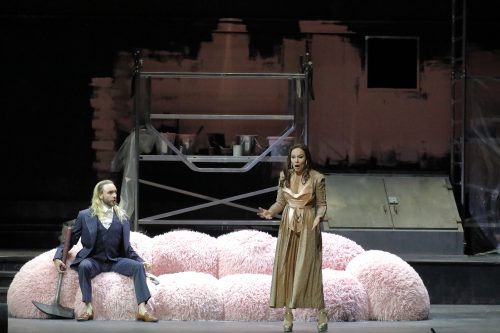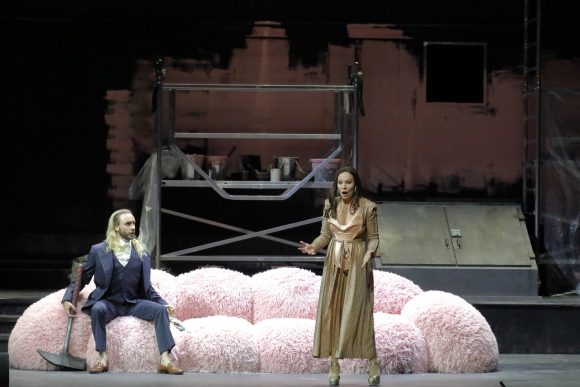 Germany Mozart, Le nozze di Figaro: Soloists, Chorus and Orchestra of Bayerische Staatsoper / Stefano Montanari (conductor). Nationaltheater, Munich, 30.11.2023. (ALL)
Germany Mozart, Le nozze di Figaro: Soloists, Chorus and Orchestra of Bayerische Staatsoper / Stefano Montanari (conductor). Nationaltheater, Munich, 30.11.2023. (ALL)

Production:
Director - Evgeny Titov
Set and costume designer – Annemarie Woods
Costume designer – Alice Babidge
Lighting designer – D.M. Woods
Dramaturgy – Katja Leclerc, Janine Ortiz
Chorus master – Christoph Heil
Cast:
Count Almaviva – Huw Montague Rendall
Countess Almaviva – Elsa Dreisig
Susanna – Louise Alder
Figaro – Konstantin Krimmel
Cherubino – Avery Amereau
Marcellina – Dorothea Röschmann
Bartolo – Willard White
Basilio – Tansel Akzeybek
Don Curzio – Kevin Conners
Barbarina – Eirin Rognerud
Antonio – Martin Snell
Two young girls – Seonwoo Lee, Xenia Puskarz Thomas
The three Mozart/Da Ponte operas are justifiably considered to be pure marvels. Yet Così fan tutte could be accused of harboring slight traces of misogyny, and Don Giovanni suffers from a slackening pace following its climax in the first act.
Conversely, Le nozze di Figaro (The Marriage of Figaro) stands as a paragon in the operatic canon, each scene laden with purpose and the narrative fat trimmed away, leaving a lean masterpiece that still allows for interpretative innovation. The work purposely does not explain exactly what happens between the Countess and Cherubino or Susanna and the Count, or even whether Figaro really recognizes the disguised Susanna…
This allows directors a degree of freedom. It also enables them to successfully set the story against a contemporary backdrop. One recalls the audacity of Peter Sellars’s rendition set in – of all places – the Trump Tower, casting a contemporary light on its timeless themes.
All of this is to say why the direction chosen by Evgeny Titov is so regrettable. In his conception, the piece devolves into a farce replete with cheap thrills: the second act has Susanna smoking weed, so that she is high as she emerges from hiding, while the fourth act unfolds on a cannabis farm. The Count is reduced to a spineless caricature, reveling in slapstick spankings. The essential chemistry between Susanna and Figaro is underdeveloped. All the gags fail to resonate with the score’s subtleties, rendering a performance that does a disservice to both the libretto and above all to Mozart’s description in music of the opera’s characters.
Stefano Montanari’s baton delivers a brisk, almost manic Mozart, trading depth for dexterity, technically precise yet bereft of the music’s expressive potential. Montanari accompanies the singers at the pianoforte very skillfully, but instead of conveying a Mozartean style as intended, the outcome harks back to the soundtracks of silent films of a bygone era.
The cast, many of whom sang in last season’s Così fan tutte (review here), shows that Munich has put together a nice troupe of Mozart singers. Louise Alder initially grappled with her role, perhaps unsettled by the demanding tempo, yet grew into her character and provided us with a moving ‘Deh vieni’. Avery Amereau presented a heartwarming Cherubino, whereas Huw Montague Rendall’s Count was regrettably underwhelming. Konstantin Krimmel’s Figaro had more authority, and his concluding aria had plenty of character. Veterans Willard White and Dorothea Röschmann were a delight. Elsa Dreisig’s Countess was also a triumph, transcending the orchestra’s hurried pace with stellar phrasing and onstage sovereignty.
But in the end, despite the earnest efforts and notable contributions from the cast, it is hard to shake the impression that this new production of The Marriage of Figaro was treated as a bawdy slapstick piece and deserved much more.
Antoine Lévy-Leboyer

I cannot claim to have the opera expertise of reviewer Antoine Lévy-Leboyer, but I feel compelled to write from my point of view as an audience member on opening night in Munich and with a background in rhetoric.
I, too, felt the urgency and feverish pace of the interpretation but it slowly dawned on me as the production went on how what M. Lévy-Leboyer calls ‘bawdy slapstick’ was a deconstruction of actions that in today’s climate are considered offensive. How to remain true to a story that contains such actions and yet to make it clear the production is not meant to reinforce these attitudes nor to let them go by without comment.
For example, the Count’s wealth, coming from a ‘grow-op’, subtly points toward ethical dilemmas in a system that favours some at the expense of others. The sexual harassment has some consequences for the perpetrator via an outrageous stage prop involving bondage and an electronic sex toy. Bawdy, yes, but not gratuitously so. As such examples came, one after the other throughout the production, I tipped my hat to the courageous decisions of Director Titov and decided it was a tour de force. Throughout I found the conducting brilliant and mesmerising. Bravissimo!
After more than 18 months of having attended the performance, I need to share my impression on this. I am a mother pretending to enrich my young daughter with the best of music and arts and I do wherever we travel together. As such, I invited her to the opera expecting the best, however I was shocked when I realized that there was a small hydroponic Marijuana plant as an ornament on a desk (that I pretended not to see) and after that the huge Marijuana forest in following scene of the opera. May be Herr Direktor wanted to attract a young audience, maybe he wanted to show an open, modern mind, but for me it was an offense against the values of morality and love that the composer wanted to convey. Apologies to Herr Mozart in his grave.